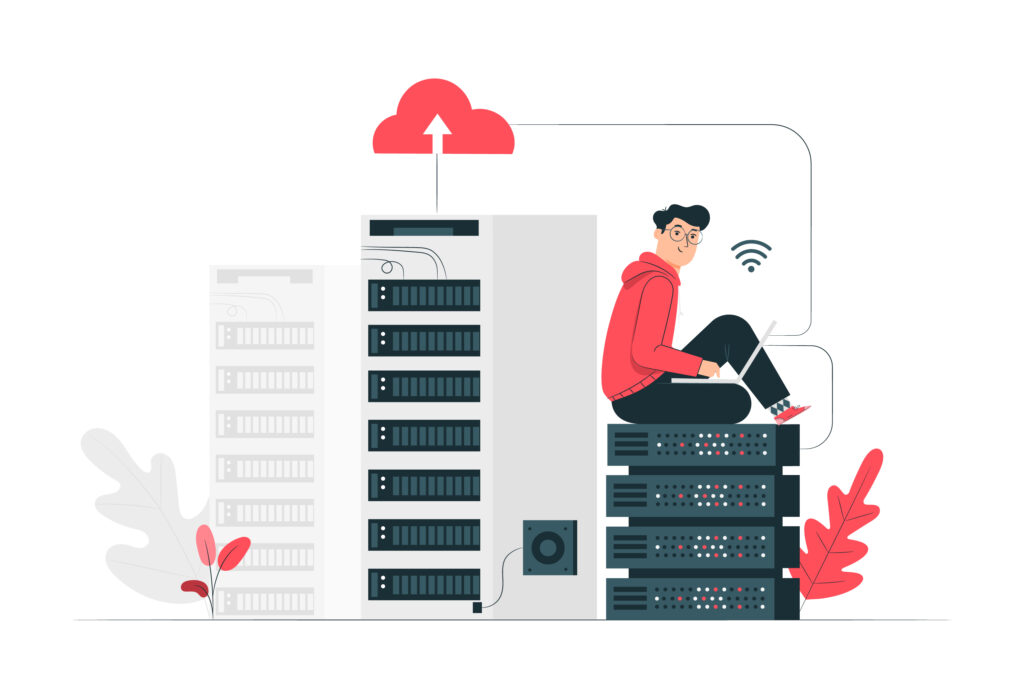What Is Managed Hosting?
Managed hosting refers to a specialized type of web hosting service that provides extensive managed services to its clients. This option is particularly favored by website owners and businesses who may not have the necessary resources or expertise to independently manage their websites.
A managed hosting provider assumes full responsibility for all aspects of website operations. This includes initial setup, intricate configuration, robust security implementations, and ongoing maintenance tasks.

By delegating these technical responsibilities to the hosting provider, customers can redirect their focus and efforts toward core business activities. They don’t have to take the burden of managing the complexities involved in website maintenance and security.
This arrangement not only simplifies the operational aspects for the client but also ensures that their website and applications are consistently updated, secure, and optimized for performance. Managed hosting thus offers peace of mind, allowing businesses to rely on expert professionals to handle the intricate details of their online presence while they concentrate on driving business growth and innovation.
The Differences Between Managed And Unmanaged Hosting
The primary distinction between managed and unmanaged hosting lies in the degree of control customers have over their website operations. In managed hosting, the provider handles all aspects of website operations, whereas, in unmanaged hosting, customers are responsible for every aspect of their website management.

Managed hosting includes a variety of features and services that are not typically available with unmanaged hosting, such as managed firewalls, access control policies, and software application management. Additionally, managed hosting offers scalability and support options like automatic backups and database management.
Conversely, unmanaged hosting requires customers to possess some technical expertise to manage their website’s various aspects. As a result, managed hosting is an excellent solution for those who prefer to focus on running their business, leaving the hosting services to manage the website and its applications.
The Similarities Between Managed And Unmanaged Hosting
Despite their differences, managed and unmanaged hosting both provide reliable platforms for website operations. Customers can access their websites globally from anywhere with an internet connection in both scenarios.
Furthermore, both managed and unmanaged hosting ensure security through protocols like SSL certificates and continuous server monitoring. These features contribute to maintaining website reliability and protecting data integrity, whether managed by the hosting provider or self-managed by the client.
Managed Hosting vs Shared Hosting
Managed hosting and shared hosting share similarities in their foundational technology and infrastructure, as both utilize shared servers managed by a web host provider. However, the crucial difference lies in the additional managed services provided by managed hosting. These services encompass advanced features such as firewalls, comprehensive management of software applications, and robust backup solutions.

This enhanced level of service not only simplifies website management for customers but also ensures heightened security, and performance optimization. It also helps in reliable data protection beyond what shared hosting typically offers.
Managed Hosting vs Dedicated Hosting
Managed hosting offers users a comprehensive, fully managed service that encompasses everything from software applications and security to backups, effectively relieving website owners of these responsibilities.
In contrast, dedicated hosting provides customers with complete control over their server environment. Users with full root access have the autonomy to install and manage these aspects independently, requiring a certain level of technical expertise to optimize and maintain their server configuration according to their specific needs and preferences.
Managed Hosting vs Cloud Hosting
The primary advantage of cloud hosting is its capability to enable customers to scale their website operations dynamically to meet changes and accommodate growth. This scalability is crucial for handling increased website traffic, surges in sales on an online store, or heightened global demands on server resources.

Cloud hosting services are generally offered as managed hosting solutions, ensuring that customers can leverage the flexibility and scalability of cloud infrastructure without the burden of managing it themselves.
Managed Hosting Features
Managed hosting distinguishes itself from other dedicated hosting options by offering comprehensive management services that encompass every aspect of website and server management. Hosting companies handle crucial tasks such as software and hardware setup, configuration, monitoring, updates, technical support, and ongoing system maintenance.
These services are designed to alleviate the technical burden from website owners, allowing them to focus on their core business activities.
Key Features of Managed Hosting:

Technical Support:
Managed hosting providers employ skilled system administrators, technical staff, and network operations engineers who specialize in various technologies. Continuous training and development ensure they stay updated with the latest technological advancements, providing superior support and ensuring long-term customer satisfaction.
Security Services:
Security is paramount for websites of all sizes. Managed hosting services include robust security measures such as intrusion detection systems, virus and spam protection, vulnerability scans, and physical security measures for data centers. These proactive measures help safeguard websites from cyber threats and ensure data integrity.
Disaster Recovery and Backups:
To mitigate the impact of unexpected disruptions, managed hosting companies implement comprehensive disaster recovery plans and offer both automatic and manual backup solutions. These measures ensure that critical data is securely backed up and readily accessible in the event of data loss or system failures.
Automated Updates:
Managed hosting services include automated update management for software and applications. This feature ensures that your programs remain up-to-date with the latest security patches and performance enhancements, without requiring manual intervention. Automatic updates minimize vulnerabilities and optimize system performance seamlessly.
Managed hosting solutions are flexible and can be tailored to meet the specific needs and requirements of businesses across various industries. By outsourcing these critical IT functions to experienced professionals, businesses can enhance operational efficiency, improve website performance, and maintain a secure and reliable online presence.
Pros and Cons of Managed Hosting

Pros of Managed Hosting:
Time saver:
By delegating maintenance and management tasks to a managed hosting provider, you free up valuable time to focus on core business activities such as strategy, customer relations, and growth initiatives. This allows you to maximize productivity and efficiency within your organization.
Reduced risk:
Managed hosting offers peace of mind with dedicated, specialized technical support available around the clock. This ensures prompt resolution of issues and minimizes downtime, crucial for maintaining operational continuity and customer satisfaction.
Flexible up-to-date technology:
Managed hosting providers are committed to staying at the forefront of technological advancements. They continuously update and optimize infrastructure, software, and security protocols to keep pace with industry trends and best practices.
This proactive approach enables your business to leverage the latest innovations without the burden of managing them internally.
Excellent performance and high speed:
Unlike traditional shared hosting environments that can be bogged down by resource-sharing among multiple users. Managed hosting solutions are optimized for performance. By tailoring resources and configurations to your specific needs, managed hosting providers ensure fast loading times. They can ensure reliable uptime and a seamless user experience. This optimization enhances website speed, responsiveness, and overall performance metrics.
Managed hosting thus offers strategic advantages beyond basic hosting services. They empower businesses to operate efficiently, securely, and competitively in an increasingly digital landscape.
Cons of Managed Hosting

Price:
Managed hosting services typically come at a higher cost compared to shared hosting options. This higher price reflects the additional value of comprehensive management and support services provided by managed hosting providers. Shared hosting, on the other hand, offers basic support and resources shared among multiple users. This makes it a more economical choice for simpler website needs.
No access to own servers:
One limitation of managed hosting is the lack of access to the server’s control panel for clients. Managed hosting providers handle all aspects of server management, including setup, configuration, and maintenance. While this ensures expert management and security, it may restrict clients who prefer more direct control over their server environment.
No email hosting:
Managed hosting plans often focus solely on website hosting and management, excluding email hosting services. If your business requires integrated email hosting along with website hosting, you may need to consider separate email hosting solutions or choose a hosting provider that offers comprehensive hosting packages to meet both needs.
These considerations highlight the trade-offs involved in choosing managed hosting. They emphasize the importance of aligning hosting solutions with specific business requirements and priorities.
What to Look for When Choosing a Managed Hosting Provider
Before finalizing your choice of a hosting provider, it’s essential to evaluate the following aspects:

Professional Communication:
Effective communication is key to a successful partnership with a hosting company. Ensure that the provider maintains professional communication channels and responsive support teams. Clear communication ensures that any issues or questions you have are addressed promptly and efficiently, contributing to a smoother operational experience.
Ownership of Hardware:
Verify whether the managed hosting company owns its hardware or relies on reselling or renting servers from third parties. This distinction can impact service quality in several ways:
Lack of Custom Solutions:
Providers without their own hardware may offer limited customization options. They are potentially requiring businesses with specific needs to find more flexible alternatives.
Limited Spare Parts:
Renting or reselling servers can lead to delays in replacing hardware failures, causing website downtime and impacting user experience.
On-Site Support Team:
Dependence on third-party hosts for on-site support may result in lower service quality and slower issue resolution, affecting website reliability.
Relevant Experience:
Evaluate a provider’s experience in your industry, asking about track record, client feedback, and successful projects. Discuss your specific needs regarding applications, CMS, and frameworks to ensure they can effectively support your business goals.
[Want to learn more on custom software development? Click here to reach us.]
In conclusion, managed hosting services offered by providers like Bobcares provide a robust solution for businesses and website owners looking to simplify server management and technical operations. By delegating these responsibilities to specialized providers, businesses can focus more effectively on core activities, assured that their websites are in capable hands. Managed hosting stands out by offering comprehensive support, including setup, security, updates, and maintenance, all customized to suit specific business needs.
While it may involve higher costs compared to other hosting options, the benefits of enhanced performance, reliability, and expert support justify the investment for many organizations. Ultimately, opting for managed hosting can significantly streamline operations, mitigate risks, and empower businesses to thrive in a dynamic digital landscape




0 Comments